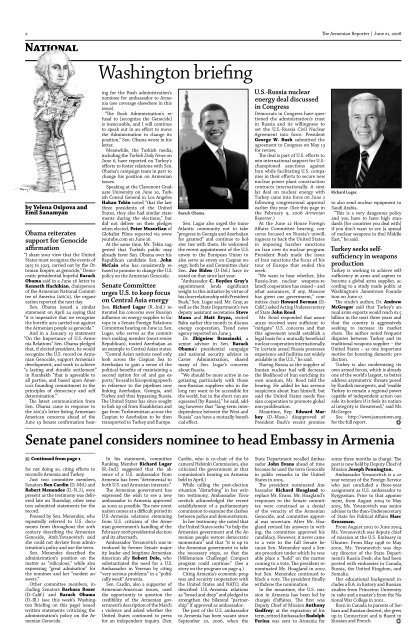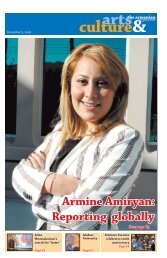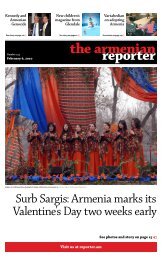Armenian Reporter
Armenian Reporter
Armenian Reporter
Create successful ePaper yourself
Turn your PDF publications into a flip-book with our unique Google optimized e-Paper software.
The <strong>Armenian</strong> <strong>Reporter</strong> | June 21, 2008Nationalby Yelena Osipova andEmil SanamyanWashington briefingObama reiteratessupport for Genocideaffirmation“I share your view that the UnitedStates must recognize the events of1915 to 1923, carried out by the OttomanEmpire, as genocide,” Democraticpresidential hopeful BarackObama said in a June 16 letter toKenneth Hachikian, chairpersonof the <strong>Armenian</strong> National Committeeof America (ANCA), the organizationreported the next day.Sen. Obama issued a similarstatement on April 24 saying that“it is imperative that we recognizethe horrific acts carried out againstthe <strong>Armenian</strong> people as genocide.”And in a January 19 statement“On the Importance of U.S.-ArmeniaRelations” Sen. Obama pledgedthat, if elected president, he wouldrecognize the U.S. record on <strong>Armenian</strong>Genocide, support Armenia’sdevelopment, and work to achieve“a lasting and durable settlement”in Karabakh “that is agreeable toall parties, and based upon America’sfounding commitment to theprinciples of democracy and selfdetermination.”The latest communication fromSen. Obama came in response tothe ANCA’s letter listing <strong>Armenian</strong>-American concerns ahead of theJune 19 Senate confirmation hearingfor the Bush administration’snominee for ambassador to Armenia(see coverage elsewhere in thisissue).“The Bush Administration’s refusalto [recognize the Genocide]is inexcusable, and I will continueto speak out in an effort to movethe Administration to change itsposition,” Sen. Obama wrote in hisletter.Meanwhile, the Turkish media,including the Turkish Daily News onJune 6, have reported on Turkey’sefforts to foster relations with Sen.Obama’s campaign team in part tochange his position on <strong>Armenian</strong>issues.Speaking at the Claremont GraduateUniversity on June 10, TurkishConsul General in Los AngelesHakan Tekin noted “that the lastthree presidents of the UnitedStates, they also had similar statementsduring the elections,” butdid not deliver on their pledgeswhen elected, Peter Musurlian ofGlobalist Films reported via www.youtube.com on June 16.At the same time, Mr. Tekin suggestedthat Turkish public mayalready favor Sen. Obama over hisRepublican candidate Sen. JohnMcCain who has consistently refusedto promise to change the U.S.policy on the <strong>Armenian</strong> Genocide.Senate Committeeurges U.S. to keep focuson Central Asia energySen. Richard Lugar (R.-Ind.) reiteratedhis concerns over Russianinfluence on energy supplies to Europein a Senate Foreign RelationsCommittee hearing on June 12. Sen.Lugar, who serves as the committee’sranking member (most seniorRepublican), touted Azerbaijan asan example to Central Asian states.“Central Asian nations need onlylook across the Caspian Sea toAzerbaijan to gain a sense of thepolitical benefits of maintaining asecond option for oil and gas exports,”he said in his opening speechin reference to the pipelines nowlinking Azerbaijan, Georgia, andTurkey and thus bypassing Russia.The United States has since soughtto link up oil from Kazakhstan andgas from Turkmenistan across theCaspian to Azerbaijan to be thentransported to Turkey and Europe.Barack Obama.Sen. Lugar also urged the trans-Atlantic community not to take“progress in Georgia and Azerbaijanfor granted” and continue to bolsterties with them. He welcomedthe recent appointment of the U.S.envoy to the European Union toalso serve as envoy on Caspian energy;both he and Committee chairSen. Joe Biden (D-Del.) have insistedon that since last year.“Ambassador C. Boyden Gray’sappointment lends significantweight to this initiative by virtue ofhis close relationship with PresidentBush,” Sen. Lugar said. Mr. Gray, aswell as the State Department’s twodeputy assistant secretaries SteveMann and Matt Bryza, visitedBaku earlier this month to discussenergy cooperation, Trend newsagency reported on June 3.Dr. Zbigniew Brzezinski, asenior advisor in Sen. BarackObama’s presidential campaignand national security advisor inCarter Administration, sharedmany of Sen. Lugar’s concernsabout Russia.“We should be more active in negotiatingparticularly with thosenon-Russian suppliers who in thelong run want to be accessible forthe world, but in the short run aresqueezed [by Russia],” he said, addinghowever that “long-term interdependencebetween the West andRussia” can have a mutually beneficialeffect.U.S.-Russia nuclearenergy deal discussedin CongressDemocrats in Congress have questionedthe administration’s trustin Russia and its willingness toset the U.S.-Russia Civil NuclearAgreement into force. PresidentGeorge W. Bush submitted theagreement to Congress on May 13for review.The deal is part of U.S. efforts towin international support for U.S.-championed sanctions againstIran while facilitating U.S. companiesin their efforts to secure newnuclear power plant constructioncontracts internationally. A similardeal on nuclear energy withTurkey came into force on June 2following congressional approvalearlier this year. (See this page inthe February 9, 2008 <strong>Armenian</strong><strong>Reporter</strong>.)At the June 12 House ForeignAffairs Committee hearing, concernsfocused on Russia’s unwillingnessto back the United Statesin imposing harsher sanctionson Iran over its nuclear program.President Bush made the issueof Iran sanctions the focus of histour of Europe that ended thisweek.“We want to hear whether, [theRussia-Iran nuclear weapons-related]cooperation has ceased – andwhat assurances, if any, Moscowhas given our government,” committeechair Howard Berman (D.-Calif.) asked Acting Undersecretaryof State John Rood.Mr. Rood responded that assurancesreceived were sufficient to“mitigate” U.S. concerns and thatthis agreement would establish alegal basis for a mutually beneficialnuclear cooperation internationally.“In [certain areas] Russia possessesexperience and facilities not widelyavailable in the U.S.,” he said.Having Russia as the supplier ofIranian nuclear fuel will decreasethe likelihood of Iran enriching itsown uranium, Mr. Rood told thehearing. He added he has serioussuspicions about Iran himself, butsaid the United States needs Russiancooperation to promote globalnon-proliferation.Meantime, Rep. Edward Markey(D.-Mass.) disapproved ofPresident Bush’s recent promiseRichard Lugar.to also send nuclear equipment toSaudi Arabia.“This is a very dangerous policyand you have to have high standards[for countries you deal with]if you don’t want to see [a spreadof nuclear weapons in the] MiddleEast,” he said.Turkey seeks selfsufficiencyin weaponsproductionTurkey is working to achieve selfsufficiencyin arms and aspires tobecome a global arms supplier, accordingto a study made public atWashington’s Jamestown Foundationon June 17.The study’s author, Dr. AndrewMcGregor said that Turkey’s annualarms exports would reach $1.5billion in the next three years andthat the country is aggressivelyseeking to increase its marketshare. The author noted frequentdisputes between Turkey and itstraditional weapons supplier – theUnited States – as one importantmotive for boosting domestic production.Turkey is also modernizing itsown armed forces, which is alreadyone of the world’s largest, to betteraddress asymmetric threats posedby Kurdish insurgents, and “enableTurkey to remain a regional powercapable of independent action outsideits borders if it feels its nationalintegrity is threatened,” said Mr.McGregor.See http://www.jamestown.orgfor the full report.fSenate panel considers nominee to head Embassy in <strong>Armenian</strong> Continued from page for not doing so, citing efforts toreconcile Armenia and Turkey.Just two committee members,Senators Ben Cardin (D.-Md.) andRobert Menendez (D.-N.J.), werepresent as the testimony was deliveredlate on Thursday; other senatorssubmitted statements for therecord.Pressed by Sen. Menendez, whorepeatedly referred to U.S. documentsfrom throughout the 20thcentury describing the <strong>Armenian</strong>Genocide, Amb.Yovanovitch saidshe could not deviate from administration’spolicy and use the term.Sen. Menendez described theadministration’s position on thematter as “ridiculous,” while alsoexpressing “great admiration” forthe nominee and her “modest answers.”Other committee members, includingSenators Barbara Boxer(D.-Calif.) and Barack Obama(D.-Ill.) (see this week’s WashingtonBriefing on this page) issuedwritten statements criticizing theadministration’s policy on the <strong>Armenian</strong>Genocide.In his statement, committeeRanking Member Richard Lugar(R.-Ind.) suggested that the absenceof a U.S. ambassador fromArmenia has been “detrimental toboth U.S. and <strong>Armenian</strong> interests.”The <strong>Armenian</strong> government hasexpressed the wish to see a newambassador to Armenia approvedas soon as possible. The new nominationcomes at a difficult period inU.S.-Armenia relations stemmingfrom U.S. criticism of the <strong>Armenian</strong>government’s handling of theFebruary 2008 presidential electionand its aftermath.Ambassador Yovanovitch was introducedby former Senate majorityleader and longtime <strong>Armenian</strong>-American ally Robert Dole, whosubstantiated the need for a U.S.Ambassador in Yerevan by citing“very serious problems” in a “politicallyweak” Armenia.Sen. Cardin, also a supporter of<strong>Armenian</strong>-American issues, usedthe opportunity to question thecredibility of the <strong>Armenian</strong> government’sdescription of the March1 violence and asked whether theUnited States continued to pressfor an independent inquiry. (Sen.Cardin, who is co-chair of the bicameralHelsinki Commission, alsocriticized the government at thatcommission’s hearing on Armeniaheld in April.)While calling the post-electionsituation “disturbing” in her writtentestimony, Ambassador Yovanovitchacknowledged the recentestablishment of a parliamentarycommission to examine the clashesbetween police and demonstrators.In her testimony, she noted thatthe United States seeks “to help the<strong>Armenian</strong> government and the <strong>Armenian</strong>people restore democraticmomentum” and that “it is up tothe <strong>Armenian</strong> government to takethe necessary steps, so that the[Millennium Challenge] Compactprogram could continue.” (See astory on the program on page 4.)Citing Armenia’s economic progressand security cooperation withthe United States and NATO, shedescribed U.S.-Armenia relationsas “broad and deep” and pledged tostrengthen the bilateral “partnership”if approved as ambassador.The post of the U.S. ambassadorto Armenia has been vacant sinceSeptember 10, 2006, when theState Department recalled AmbassadorJohn Evans ahead of timebecause he used the term Genocidein public remarks in the UnitedStates in 2005.The president nominated AmbassadorRichard Hoagland toreplace Mr. Evans. Mr. Hoagland’sresponses to the Senate committeewere construed as a denialof the veracity of the <strong>Armenian</strong>Genocide, and committee approvalwas uncertain. After Mr. Hoaglandrevised his answers in writing,the committee approved hiscandidacy. However, it never cameto a vote in the full Senate becauseSen. Menendez used a Senateprocedure under which he wasable place a “hold” on the mattercoming to a vote. The president renominatedMr. Hoagland in 2007,but Sen. Menendez continued toblock a vote. The president finallywithdrew the nomination.In the meantime, the U.S. missionin Armenia has been led bychargés d’affaires. The first wasDeputy Chief of Mission AnthonyGodfrey; at the expiration of histerm, retired Ambassador RudolphPerina was sent to Armenia forsome three months as chargé. Thepost is now held by Deputy Chief ofMission Joseph Pennington.Ambassador Yovanovitch is a 22-year veteran of the Foreign Servicewho just concluded a three-yearassignment as U.S. ambassador toKyrgyzstan. Prior to that appointment,from August 2004 to May2005, Ms. Yovanovitch was senioradvisor to the then-Undersecretaryof State for Political Affairs MarcGrossman.From August 2001 to June 2004,Ms. Yovanovitch was deputy chiefof mission at the U.S. Embassy inUkraine. From May 1998 to May2000, Ms. Yovanovitch was deputydirector of the State Department’sRussia Desk; she had beenposted with embassies in Canada,Russia, the United Kingdom, andSomalia.Her educational background includesa B.A. in history and Russianstudies from Princeton Universityin 1980 and a master’s from the NationalWar College in 2001.Born in Canada to parents of Serbianand Russian descent, she grewup in Connecticut and is fluent inRussian and French.f

















